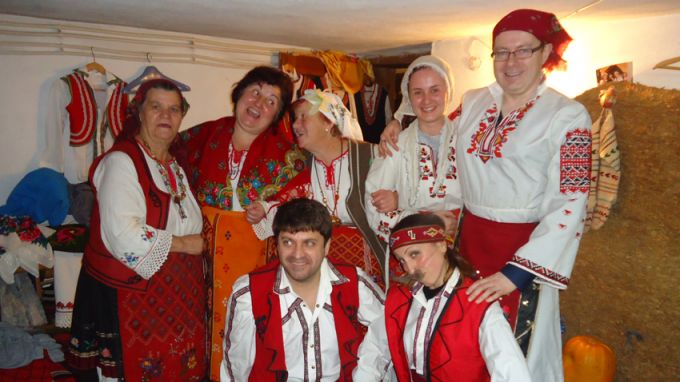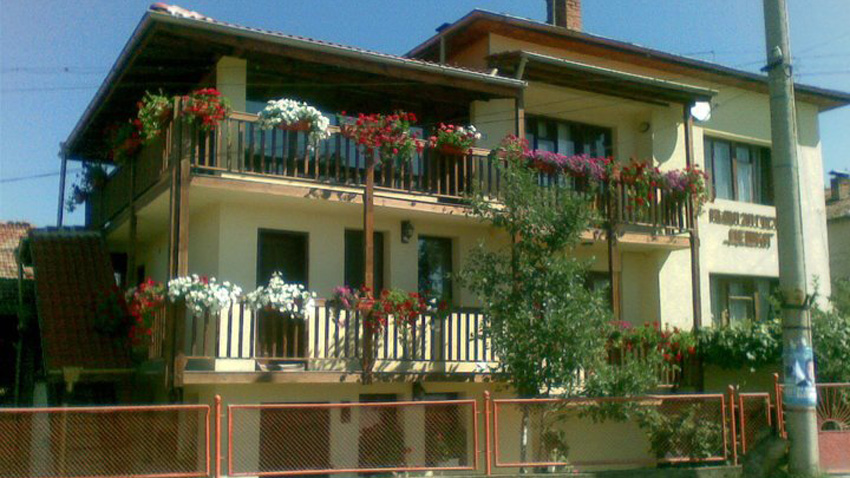
“Any crazy idea can be a winner,” says 50-year old Deshka Kroteva from a pretty village in Rila Mountain, Southwestern Bulgaria. Gorno Draglishte is a village people do not leave, just the opposite – they come back here to stay. And that is what makes it so different from so many other Bulgarian villages, whose population has been dwindling, putting them on the road to oblivion. Gorno Draglishte is bubbling with life; rhythm and movement set the atmosphere in motion. Young and old alike live in a happy symbiosis; observing traditions and passing them down to the next generation untouched is divine law.
To love and cherish all that is Bulgarian, the uniqueness of local products and food is an idea that children here are taught at the earliest age. “We cherish what we have learnt from our parents, because it is priceless and is this village’s chance of a livelihood now and in the future,” says Deshka Kroteva. Her life has been an unusual one. Once, she studied at a specialized secondary school for seamstresses in Petrich. Then, together with her husband, she took the plunge into the private sector. “We wanted to manufacture bread, and for a time had cows. Then, we opened a knitwear mill, but ultimately opted for rural tourism and that was the idea that turned out to be a winner.” The family runs a guest-house and welcomes visitors from Bulgaria and abroad who come here for the clean air of the beautiful mountain. Gorno Draglishte is a mere 15 kilometers from the resort of Bansko and just 12 from Razlog. And Deshka is full of ideas how to attract guests here so that they will come back time and again. She gladly demonstrates how her grandmother’s loom works; those who want to can try their hand at weaving a Bulgarian rug. The more foolhardy can try milking the cow. Here is what Deshka Kriteva says about the village where she was born, where she lives and where she is expecting her third grandchild:
“We live in the southern portion of Rila Mountain, but we are surrounded by mountains on three sides – Rila, Pirin and the Rhodopes. Few towns or villages can say the same. The village has a population of around 1,100, we are a living and breathing village, we have a primary school for children from the 1st to the 8th grade, the kindergarten is full of children. And I can say we are all live together in harmony. The ski runs in Bansko are close by, as are the mineral springs in the village of Banya. There are eco trails that start from the village and we have trained guides. Besides the beautiful landscape, there are other things to do, like learning how to do the household work in a village home.”

One of the traditions in Gorno Draglishte that has come down to us untouched and is practiced by Deshka’s family is a unique product, awarded the Guardian of Tradition prize at the end of last year. The product is called nafpavok, and it received the greatest number of online votes in the competition launched by the Association for the Promotion of Arts and Crafts. The meat delicacy, also called Bulgarian prosciutto, is something all guests coming to Deshka’s houses are treated to. Its flavour is unique; it is only made in the months of December and January using fresh pork and spices. And it can safely be said that the dry-cured nafpavok beats other world famous meat products.
“We are very keen on home-made food, so we want the animal to have been bred in the best of conditions,” Deshka Kroteva says. “We take the best meat – loin, ham and shoulder. We add spices – caraway, fennel and coriander, nothing more. And of course – salt. It is then stuffed into intestines. But to make nafpavok you need to be an adept.”
Then the delicacy is left to dry in several stages over several months – how that is done exactly is known to a select few. “The nafpavok is not to be eaten at any time of the year,” Deshka adds. And one more thing: if you eat it in March, you will find it has one kind of flavour, in summer and autumn it will be different, she adds. Deshka’s family have been making nafpavok for more than 70 years.
Gorno Draglishte is frequented by schoolchildren from all parts of the country for what are known as green classes. The locals gladly show them the customs in these parts, the local dishes, the secrets of the mountain. And all this to help kindle a love of all things Bulgarian.
“We show the children how they should act out in the open, we teach them to identify different herbs or how to make banitsa. So, in the time they are here, they forget their computers and mobile phones.”
And the reward is even bigger when, happy with their stay in Gorno Draglishte, the children come back, but this time with their parents.
English version: Milena Daynova
Photos courtesy of Deshka Kroteva
Three evenings of live rock music are set to energise the mountain resort of Bansko this week, as the Municipality hosts a festival showcasing some of Bulgaria’s most popular bands. From July 17 to 19 , performers including Ahat, No More Many More,..
Payment of the new, higher pensions, which came into effect at the start of the month, has begun. This increase was implemented under the so-called 'Swiss rule', which adjusts pensions in Bulgaria in line with inflation. This time, the increase is 8.6%...
The Bulgarian folk dance group Bulgaria , which is based in central England, came second at an international dance festival in Wales with 93 points. The group narrowly missed the top spot, which went once again to the favourites from Northern Ireland,..
The Bulgarian folk dance group Bulgaria , which is based in central England, came second at an international dance festival in Wales with 93 points. The..
Three evenings of live rock music are set to energise the mountain resort of Bansko this week, as the Municipality hosts a festival showcasing some of..
Payment of the new, higher pensions, which came into effect at the start of the month, has begun. This increase was implemented under the so-called 'Swiss..

+359 2 9336 661
